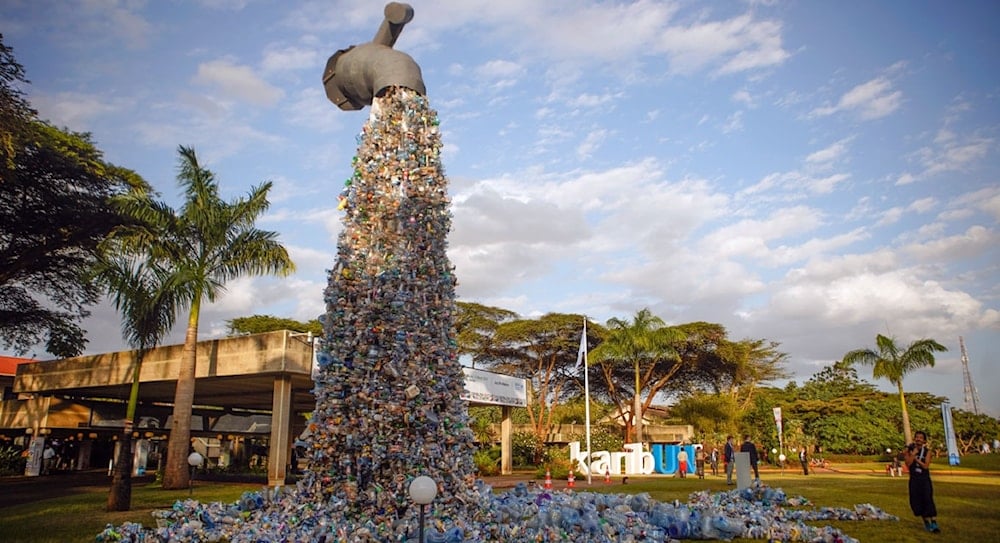Global plastic talks face hurdles amid obstruction warnings
Global negotiations in Busan, South Korea, aimed at finalizing an ambitious treaty to combat plastic pollution, have faced significant hurdles as a small group of mostly oil-producing nations resist key measures.
-

A 30-foot high monument entitled Turn off the Plastics Tap by Canadian activist and artist Benjamin von Wong was exhibited at the UN Environment Assembly in Nairobi, Kenya, in 2022. (UNEP)
Dozens of countries on Sunday criticized a small group of nations for obstructing efforts in South Korea to finalize a groundbreaking global treaty to combat plastic pollution. As negotiations in Busan neared their scheduled conclusion, delegates highlighted resistance from mostly oil-producing nations on critical issues such as reducing plastic production and phasing out potentially harmful chemicals.
"We are also worried by the continuing obstruction by the so-called like-minded countries," stated Olga Givernet, France's minister delegate for energy. She emphasized that securing an ambitious treaty "remains an absolute priority," affirming, "We are planning on pushing it."
Plastic production is projected to triple by 2060, with over 90% of plastic currently unrecycled. While delegates agree on the severity of the problem, they remain divided on solutions. Nations like Saudi Arabia and Russia argue the treaty should focus solely on waste management and oppose binding global measures, as reflected in their public statements and submitted documents.
'Blocking the process'
"It is disappointing to see that a small number of members remain unsupportive of the measures necessary to drive real change," said Rwanda's Juliet Kabera.
She warned, "Rwanda cannot accept a toothless treaty," while Fiji's Sivendra Michael accused a "very minority group" of "blocking the process."
The latest draft text contains multiple options, highlighting divisions among negotiators. Despite delays in releasing a promised updated draft, the talks, spanning two years, are intended to conclude in Busan by Monday morning, according to sources.
Portuguese delegate Maria Joao Teixeira expressed concern that talks might collapse, necessitating another negotiation round elsewhere. "We are really trying to not have a weak treaty," she stated.
Environmental advocates have urged ambitious nations to push for a vote if discussions remain stalled. However, experts caution that such a move could alienate some countries supporting a robust treaty. Alternatively, the talks' chairperson could impose an agreement over objections, though this might harm future diplomatic efforts.
'Hope in consensus'
Mexico’s lead delegate, Camila Zepeda, rejected the idea of calling a vote, saying, "We have hope in consensus. The multilateral process is slow, but there is a possibility of having critical mass to move forward." German delegate Sebastian Unger echoed this sentiment, warning that excluding key nations could undermine the treaty's effectiveness.
Over 100 countries now support a production cut target, with many also backing the phasing out of certain chemicals and unnecessary plastics. Yet, representatives from the two largest plastic producers, the United States and China, did not join a press conference advocating ambition. "They are still considering, and we are hopeful that there will be some interest on their part," Zepeda noted, adding, "This coalition of the willing is an open invitation. And so it's not like it's them against us."
As negotiations intensified, Panama's Juan Carlos Monterrey Gomez delivered a passionate plea, declaring, "History will not forgive us" if the talks end without an ambitious treaty. "This is the time to step up or get out," he urged.
Read next: Microplastics crisis: Pollution levels could double by 2040

 3 Min Read
3 Min Read









